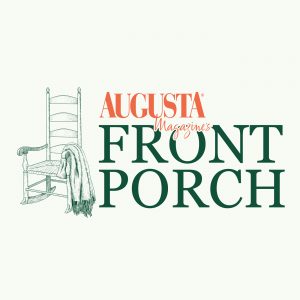Artist Award
Henry Wynn
Henry Wynn likes to play the guitar, likes to draw and likes to deflect attention from himself. Sorry, Henry.
“I hope they don’t make me do any public speaking at the award banquet. I get real nervous. It starts in the brain and moves to the fingers.” That can be a real problem for a finger-picking guitarist.
But Wynn’s managed to fend off those nerves successfully enough that among the groups he plays with he’s booked pretty solid every week at restaurants, weddings and parties. Sometimes it’s just he and his son, also Henry, a fiddler, performing as the aptly named The Henrys. When their friend Doug Johnson joins them they are Doug and the Henrys. They’ve been named Augusta’s best bluegrass group several years in a row. “But it’s not really bluegrass,” Wynn insists. “There’s no banjo. We’re really a string band.”
Wynn’s wickedly fast fingers fly up and down the fingerboard and pick intricate patterns on the strings—amazing to witness—and then you notice, he’s doing it all upside down. He’s a lefty in a world or right-handed guitars.
But he loves them. Martin guitars especially—their history, their sound, their look and feel—are his passion. His house is like a Martin museum. “I got my first Martin in 1973. I’ve had about every model Martin ever made. I’ve researched how many of each were made, what variations there were. All those details stick in my head, though I can’t remember what I had for breakfast.”
But that’s just half of Wynn. Most of his working life he spent as an artist. His ink drawings, given depth and shadow with stipple pointillism, are meticulously, painstakingly detailed. One of his first jobs as an artist was rendering, with as much accuracy as possible, artifacts found at archeological sites.
A native of North Augusta (his grandfather was a signer of the city’s first charter), Wynn studied art at Augusta College and Shorter College, then started working at Fort Gordon in 1977 as an illustrator for the Army. “I started with horrible training manuals thicker than a Gutenberg Bible. I graduated to cartoony stuff, medical illustration and displays for the hospital.” He won international awards for his work with the Army. But his days at work were just practice. “Work was warming up.” He’d come home and draw “the real stuff,” mostly out of his imagination, till 1 a.m.
Wynn retired from the Fort in 2006. Since then he’s done all kinds of stuff: limited edition prints of local historic buildings, logos, fantasy visions, portraits. “I think it’s funny: art people think I’m a guitarist, guitar people think I’m an artist, so I’ve got them both fooled.”

President’s Award
Steve Walpert
Steve Walpert was attending a theater conference with Betty, his wife and partner in all things, when someone called, “Steve, remember me?” It was a voice from 30 years ago. “You changed my life! I was a soldier at Fort Gordon. I’d never been on stage before, but you cast me in a show and you liked the way I sang and got me to apply for the Army’s Soldier Show, helped me make my audition tape. I traveled with that show for a year, then got into music school. I’ve been a teacher for 20 years. Wait here!”
He ran off and brought back 20 kids. “This is the guy I was telling you about. He changed my life.” The kids pressed around for a picture with this life-changing legend.
Walpert has been changing lives, one show at a time, for almost 40 years at Fort Gordon, where he headed up the Music and Theatre Program and the popular Dinner Theatre, directing about five shows per year with volunteer casts and crews numbering 20-100 per show, entertaining thousands of audience members. It adds up to huge numbers.
“It’s not equivalent to the discovery of penicillin, but in a small way, people’s lives are changed as they watch a show,” Walpert says. “When you can add to the quality of life for tens of thousands of people by your work, that’s something to be proud of.”
Walpert points out that as director he’s only the organizer of thousands of creative ideas and actions that come from the performers, crew and staff. And none of it could have happened without the Army’s continued investment in the Music and Theatre Program, improving soldiers’ morale and recreational opportunities and creating a unique bond between Fort Gordon and Augusta.
It was Walpert’s own chance encounter with the program as a Second Lieutenant at the Fort in 1970 that changed his life. After Vietnam and a job in California, he returned to Fort Gordon as a civilian to direct the program.
“I’m here as a result of the entertainment program and those in it who did things for me. And now I’ve gotten to do it for others.”
In preparation for retirement, Walpert has been posting pictures of decades of shows. “Every time I look at pictures, a flood of memories comes over me—wow, I loved all these people, wow, that guy really hated me, wow, did I really wear shorts that short? You see the evolution of the person you were.” And he’s been reminded that almost everyone in those pictures was a volunteer.
“It has been great, but it really is time to go.” In retirement Walpert will write, direct occasionally and spend the time with Betty and his two grown daughters that all those nights at the theatre deprived him of.

Media Award
Drew Dawson
The velvet voice announces, “From the campus of Augusta University, this is 90.7, WACG and WACG-HD Augusta, part of the Georgia Public Broadcasting Radio Network.”
The voice belongs to station manager Drew Dawson, who arrived in Augusta from WGBH in Boston in 2013, drawn to Augusta’s much smaller public radio station by the promise of a blank slate and the mission to re-build the station. During the network’s recessionary belt-tightening, it had done little more than air programming from Atlanta.
Dawson has focused the station on Augusta again, creating local programming and providing opportunities for Augusta University students. “This station is a great creative outlet operating in the public interest, an opportunity to make an impact on the city and area,” Dawson says. “The more opportunities I become aware of, the more I can understand what the public interest is.”
The three-day drive in car and truck from Boston to Augusta with wife and 15-year-old son in July 2013 did not bode well. They arrived hot and tired at their new home, stepping into what felt like 9,000 degrees. But then neighbors, met seconds before, helped unload the truck, brought pimento cheese sandwiches, lemonade, and sweet tea. The Dawsons weren’t in Boston anymore.
“We started approaching town like tourists. We visited the James Brown statue, took canal cruises, went horseback riding at Fort Gordon, attended Arts in Heart, visited Phinizy Swamp. Every weekend we were doing something different. Augusta was a cultural nirvana. When someone says there’s not much to do in this city, I say, ‘Have you lost your mind?’ I’m an advocate of this place.”
Dawson has added to the area’s cultural attractions, partnering with Augusta University’s music department in creating Jazz at the G, a jazz series in the Summerville Campus’ amphitheater. The series draws the community to the campus, gives music students opportunities to learn from artists and recruits for the university. Last year a similar program for classical music was launched.
Dawson has created on-air content from and about Augusta. There’s the Medical Minute from the university’s medical campus; university interns research, write and announce This Week in Augusta, record and edit the Southern Soul and Song series for broadcast, create feature packages such as Cherry Tree Stories (interviews with the last residents of Cherry Tree Crossing) and Where I’m From (interviews with successful artists from Augusta).
An employee of Augusta University, not GPB, Dawson is uniquely positioned to make WACG benefit the university, the Augusta community and Georgia Public Broadcasting. And that’s exactly what he plans to keep doing.

Corporate Award
Beasley Media Group
Mark Haddon keeps an acoustic guitar handy beside his desk at Beasley Broadcasting. You never know during the day when you might need to refresh yourself with a little music.
Music has always been important to Mark’s family at home, school and church. His dad sings in the Columbia County Choral Society. So it shouldn’t be a surprise that as vice president of Beasley Broadcasting Group’s seven Augusta radio stations Mark sees to it that the company supports the area’s arts.
“We want to be connected with the community in every way we can. We’re a for-profit company, but if we just take and take and take and not give back, it’s not going to work long-term. One way we give back is supporting the arts. Like Arts in the Heart. We’ve been part of that for years and years. It’s good for the city good for us.”
So Beasley produces and airs free advertising festivals and sends its vans and on-air personalities, flashing lights, shaking hands. “That makes it real for people. It helps the festival and it helps us connect with the community. We want to make clear that we’re a local operation and we want to serve this community.”
For economic reasons, many corporate radio stations live by satellite, featuring on- air talent beamed from remote locations far removed from the CSRA and its culture. Beasley uses the satellite feed too, but emphasizes local talent and local topics at its stations. Haddon grew up in Thomson. He’s worked at Beasley for more than 20 years, so he knows the company culture.
Beasley started as a single station owned by an educator in rural North Carolina. “Through the years that local commitment so necessary in that first station has been handed down,” Mark says. “We know it’s good for us to stay involved in the local community.”
Beasley’s Augusta stations are WRDW-AM, WKXC (Kicks99), WHHD, WGUS, WGAC, WDRR (BobFM), and WCHZ (Hot Augusta). They cover pretty much every format of talk and music.
“We use the public airwaves and we’re required to serve the public interest. If we fail in that mission, we stand to lose our license. We could do the minimum of public service, but it’s in our interest to do more.”
Among the arts events and groups Beasley publicized or planned this year are Arts in the Heart, Southern Soul & Song, Friends with Benefis, Davidson Fine Arts School, Symphony Orchestra Augusta, Kicks99’s Guitar Pull for The United Way, Party in the Park concert for the Exchange Club of Columbia County, Broadway at the Bell, Columbia County Choral Society, Music for Memories for the Jud C. Hickey Center for Alzheimer’s Care, Rock 4 the Cops and Rock Fore! Dough.

Volunteer Award
Linda Scales
Linda Scales speaks quietly, but her work dances, sings and makes art all over Augusta. That work is the Jessye Norman School of the Arts, which she created in 2003 to give inner-city kids the opportunity to explore dance, music, visual art, writing and drama after school for free.
JNSA started with baby steps in borrowed facilities with about 15 kids from Tubman Middle School. Now after 13 years, the program serves more than 100 students from 23 middle and high schools.
Linda moved to Augusta in 2000 when her husband, the Rev. Lou Scales, came to serve at St. Paul’s Episcopal Church. Lou had been a military chaplain at bases all over the world. Linda supervised children’s and youth programs at those bases. Now in Augusta, an ordained Episcopal Deacon herself, she sought ways to serve this community.
She started a Head Start program at St. Paul’s, founded the Rachel Longstreet Foundation and created a park for handicapped children. What next? On retreat at the Convent of St. Helena, she found the answer: an arts school.
“Jessye Norman says, ‘To find your voice in the arts is to find your soul,’” Scales says. “The arts are a way for children to discover who they are and who they can be. The arts help them discover their own depth, skills and talents. Everybody has a special talent, and that’s a gift from God.”
The school strives to create not artists and performers, but whole human beings. “The arts unlock life skills. Parents have told me, for instance, ‘My child was shy and withdrawn until she got involved in drama. Now she’s found her voice—she’s not afraid anymore.’ There are stories like that in all the arts.”
As president of the board, Scales nurtures stability. “Lots of these children come from dysfunctional families. One girl changed schools five times in her senior year. She relied on this place for her sense of security. That’s not unusual. Families have struggles. Lots of children are being raised by children. They need stability in their lives, and this school has become that. Many attend five days a week for four to six years. We can have a real impact on lives. We teach the skills of effective people—to look someone in the eye, say yes sir, no sir, have respect for individual differences.”
And no JNSA kid will fail at his or her school. Built into the day is time for homework, tutoring, computer work. No student enrolled in the program has ever dropped out of school. Maybe that’s Scales’ finest work of art.

Arts Professional Award
Patricia Myers
A hot day in Cuba in the 1950s, lunchtime at the convent school. Through a window the little Abosolo girl hears a nun giving a piano lesson. The music thrills her. “I want to do that,” she tells her parents.
Fleeing Castro, her family came as refugees to America in 1960. They settled in Augusta with a little more than nothing. But they put together enough to buy a piano and get their daughter lessons with Lydia Porro.
The girl grew up and attended Augusta College. She sang Mozart’s Missa Brevis with the college choir in the 1970s. “I want to do this forever,” she thought.
And so she has. Patti went off to study vocal performance at graduate school, sang for a time in Germany, married tenor Mark Myers and had a daughter, Arwyn.
Patti Myers returned to Augusta University to teach music and humanities part time in 1991. Soon she was an adjunct, then a full-time faculty member of the music department, much beloved in the classroom and voice studio for her warmth and enthusiasm.
“It was payback time,” Myers explains. “I came back to the college to share the joy I had felt as a student.” In her 25-year career at the college she did much more than that. In 2006 she started the University Opera Ensemble, in 2009 the Women’s Ensemble. Over the years her ensembles produced many musicals and operas, including Kiss Me, Kate, The Music Man, Oklahoma, Into the Woods, Orpheus in the Underworld, The Magic Flute and Suor Angelica.
Her musical direction culminated this past yeae in what she jokingly calls “The three ‘f’s’: The Fantasticks in the fall, Mozart’s Marriage of Figaro in February and (from the sublime to the ridiculous) Le Chat Noir’s production of The Full Monty in May.
All three were happy experiences, but Figaro brought special satisfaction: “Standing in front of that orchestra on Valentine’s weekend, seeing all those community members in the audience and conducting Mozart—who was my start with his Missa Brevis, I’ll always treasure that.”
The circle was complete. Myers retired from the AU having created an opera program that has now grown into the American Opera and Musical Theater Institute. “It’s very fulfilling to get the community involved and replace something (the Augusta Opera) that no longer exists. Now under its director, Tonya Currier, it can take on a life of its own.”






